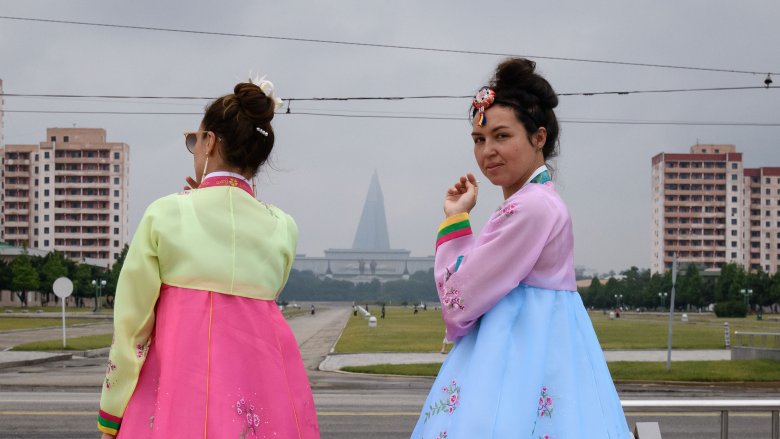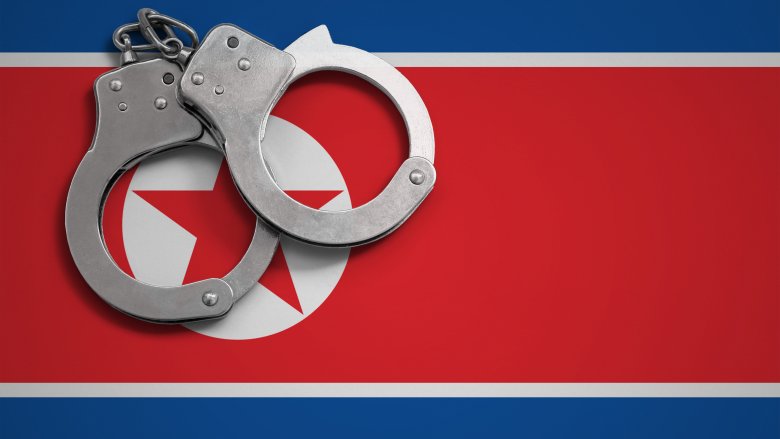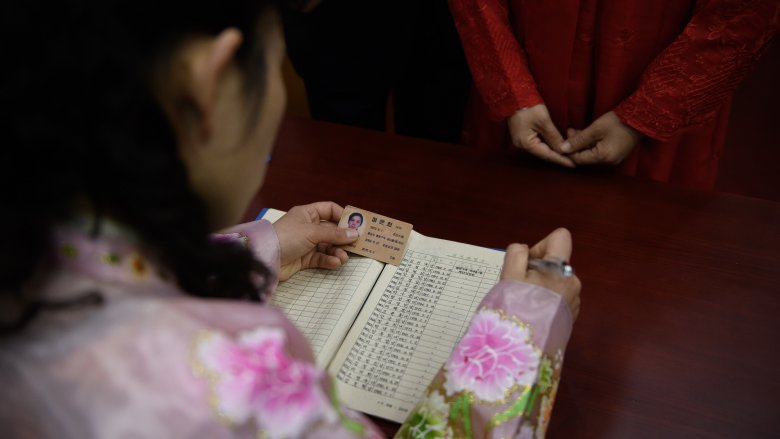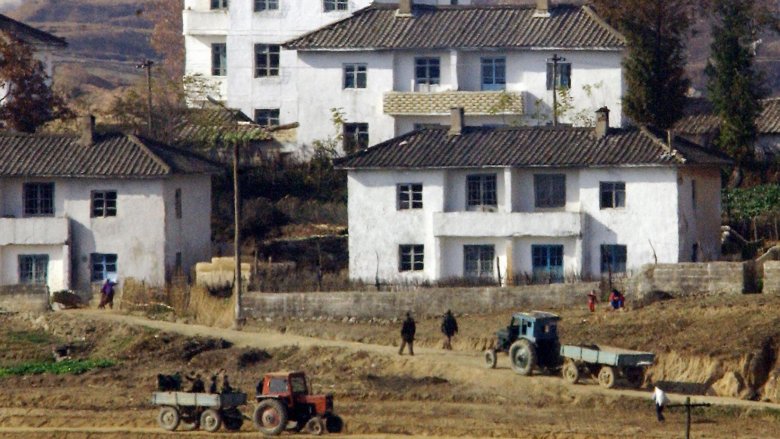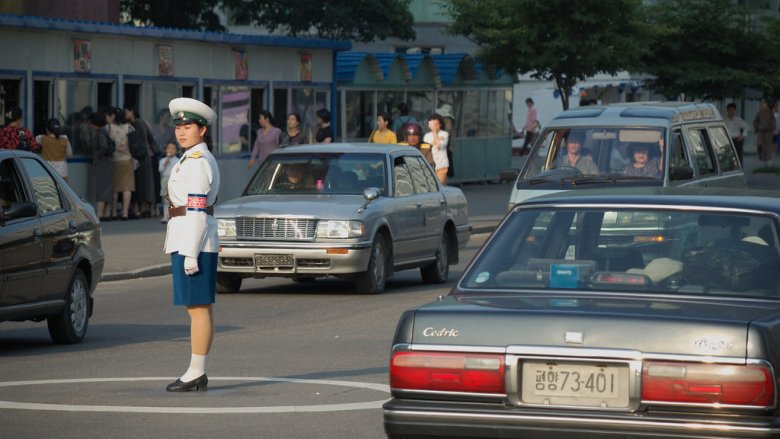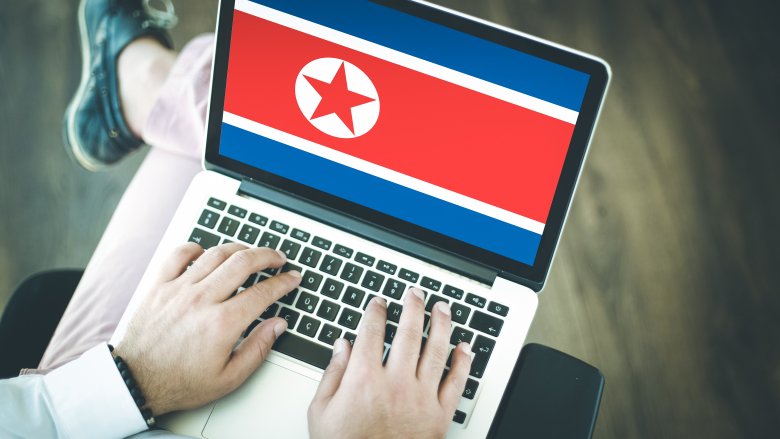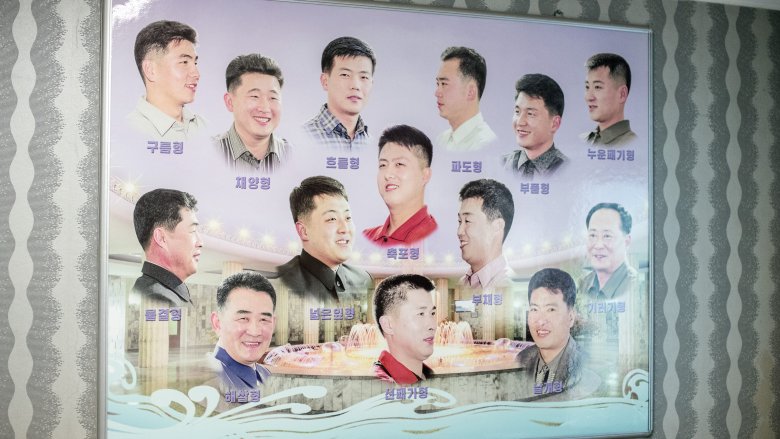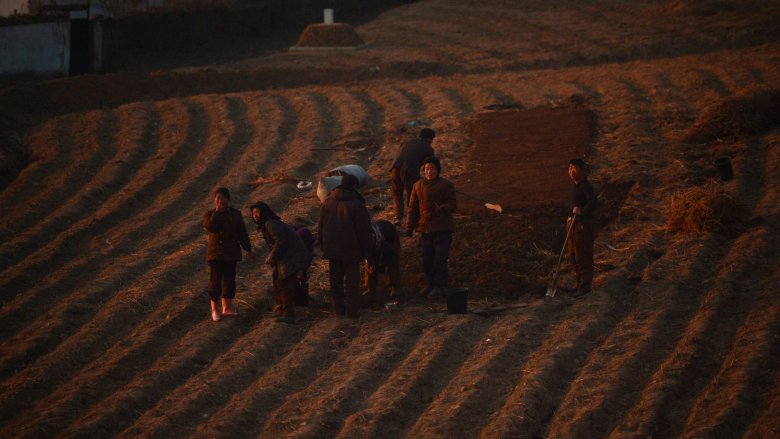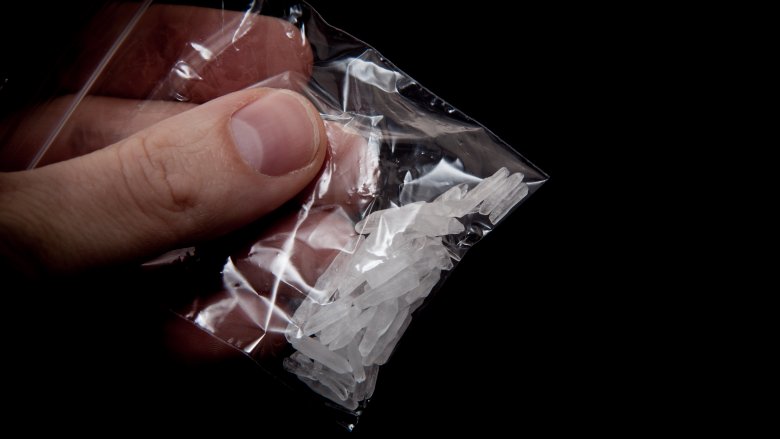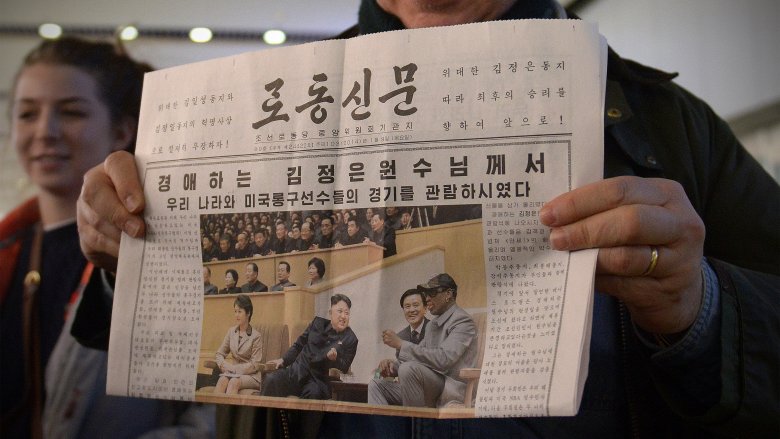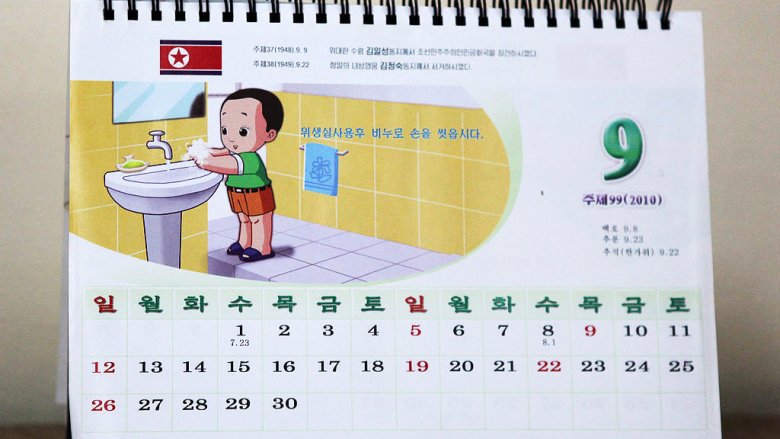Bizarre Things That Only Exist In North Korea
To put it very lightly, North Korea is different than anywhere else in the world. While other countries get more and more connected, the Democratic People's Republic of Korea has become increasingly isolated since the Korean War's armistice in 1953. Ruled by a succession of megalomaniacal and paranoid leaders, information about what really goes on there is limited. But what the world does learn from defectors, spying, and various other means paints a picture of a country that is unique in ways that are sometimes funny and sometimes deeply concerning.
Life in North Korea is not fun for its citizens, and much of that comes down to the creative ways the regime finds to oppress them. Even other tyrants don't manage to crush their populations with so much originality. Thankfully, for some comic relief, their isolation also means North Korea has to come up with their own versions — usually slightly ridiculous ones — of the things the rest of us take for granted.
Punishment the whole family can enjoy together
Kim Jong-un is pretty much one guy trying to keep an iron grip on 25 million people, many of whom are starving. The Kim family has decided the best way to do it is through fear. Punishment in the country is absolutely horrific. Human Rights Watch reports citizens are systematically denied basic freedoms and threatened with detention. Prison camps are intentionally inhumane to scare people enough they won't even think of doing anything wrong and risk ending up in one. There are routine public executions for vague crimes to keep everyone terrified.
But while all of that is bad, it's not unique to North Korea. Other despotic regimes like Saudi Arabia and Syria do terrible things to their people as well. Where North Korea goes even further is with their three-generation punishment rule, also known as collective punishment. According to the BBC, if you are suspected of a political crime, you're sent to the absolute worst kind of labor camp, called kwan-li-so. These places are "harsh beyond endurance," and inmates are routinely starved, beaten, tortured, and sexually assaulted. It's not just the person who was convicted, though; it's up to three generations of their relatives as well, even if no one else in the family is even remotely suspected of a crime. You could be the most loyal citizen in North Korea but if your granddaughter gave the finger to a picture of Kim Jong-un, you could spend the rest of your life in a labor camp.
A caste system based on loyalty
From the moment you are born in North Korea, your life is more or less laid out for you. Sure, maybe you'll rebel and end up in a labor camp, or risk trying to escape the country, but in general your parents can predict your future. That's because everything depends on your classification in North Korea's caste system, known as songbun. Unlike India's social hierarchy, this one is based on a "family's history of perceived loyalty to the government," according to Human Rights Watch.
The system began in 1957 as part of Kim Il-sung's consolidation of power, but it takes into account family loyalty to Korea as far back as 1910. There are three main categories, which then have many subdivisions. You're either "core," "wavering," or "hostile." If you and your family have been the most loyal loyalists to ever loyal, great. You get plenty of food in a country that is continuously low on it, you have permission to live in Pyongyang, and you could get a job as a government official. If you and your family are in the lower groups? The government probably made you move to a tiny village and become farmers, doing backbreaking work for barely enough sustenance.
This really kicks in when you turn 17 and want to go to college. The Guardian says only potential students with acceptable songbun will be admitted to the country's best universities. However, the admission departments have been known to overlook a low classification if you somehow have enough money to bribe them.
A propaganda village no one lives in
North and South Korea are separated by a thin strip of land serving as a buffer, since they're technically still at war with each other. It's called the Korean Demilitarized Zone, or DMZ. South Korea built a village on their side of the DMZ, meant to show any North Koreans looking over how great life could be if they escaped. According to Amusing Planet, the 226 residents who live there get major perks, like paying fewer taxes, free farmland, exemption from compulsory military service, an incredible school system, and abnormally large household incomes.
North Korea also built a propaganda town, known as "Peace Village," just in case anyone actually wants to defect to the totalitarian regime. Unlike the South Korean version, this village is a complete sham. Australian Broadcasting Corporation reports that, first and foremost, no one lives there despite North Korea's claim it houses 200 people. While there are houses, schools, daycare, and a hospital, every building is just a concrete shell. They didn't even waste money installing glass in the windows. Lights turn on and off, but observers say they seem to be on an automatic timer. The only human activity is people brought in to sweep the streets and sometimes tend the surrounding fields to keep it looking nice.
The village also has a massive flagpole that was at one point the tallest in the world (it's now the fourth), which they built just to dwarf the one in the South's propaganda village.
Hot women directing traffic
North Korea isn't known for many things that aren't absolutely horrible, which makes their iconic traffic girls a nice change. They even have their own fan pages around the internet. According to Young Pioneer Tours, back before stoplights were common, North Korea, as well as many other places, used humans to direct traffic. In Pyongyang, young, attractive, single women were selected. Now even North Korea can afford traffic lights on every corner, but the women are still ubiquitous, with about 50 of them working in the capital, and they have become national symbols, reports the Washington Post.
It's an extremely coveted job. Koryo Tours says the traffic officers are reported to get better pay and more food than the average North Korean, as well as free housing and health care. They wear crisp, military-style uniforms and stay at their posts in all weather. Kim Jong-il was said to take a "personal interest" in the girls, and he bought them all new equipment, including fancy, umbrella-covered platforms to stand on. Less important men like them as well; traffic women are supposedly "highly desired" by guys in the country. Their good looks and higher social status means "competition for their affection is fierce."
In 2013, one traffic girl received North Korea's highest military honor. Even for a job everyone there loves, this was weird. While video of her getting the award was released, the reasoning behind the honor was extremely vague. One theory is she accidentally stopped an assassination attempt when directing traffic.
The worst internet ever
North Korea strictly controls its citizens' access to information. According to Vox, you need permission from the government to own a personal computer, and they are each registered with the police as if they were dangerous weapons. You'd think the government would just ban the internet outright, but for various reasons they don't. While most of the country couldn't dream of affording a computer to access it on, an extremely small segment of the population uses computer labs in offices, universities, and cyber cafes in major cities. However, internet in North Korea isn't like in the rest of the world.
For one thing, it's an intranet, not the real internet. Kwangmyong ("bright star") runs off pirated Japanese versions of Microsoft software and looks a bit like the internet did in 1994. The BBC reports that as of 2016, users could access fewer than 30 websites. The list was accidentally discovered by a U.S. engineer and showed the world what North Korea allowed its internet users to see. Mostly it consists of propaganda, government business, tourism information, and some recipes and North Korean films. All the websites are extremely basic and load slowly, probably because many of the people accessing them still do so on dial-up.
Of course, the very highest elite in the country don't have these limitations. It's estimated that a few thousand people, mostly top government officials, have access to the full outside internet. So if any of them are reading this, hi! Your country is weird.
Real fashion police who destroy unacceptable clothes
One way to keep people in line, so the thinking goes, is to put them in uniforms. When everyone looks the same, it's harder to rebel. Clothing is a huge part of self-expression. So North Korea controls everything about its citizens' appearances. According to a women's magazine published by the government (via Refinery29), clothing needs to be loose-fitting and modest, with any foreign trends totally forbidden. Women's looks must "fit the socialistic way of living," while those who express individuality in their attire should be shamed. While a report that there were only a small number of haircuts allowed in North Korea was never confirmed, the magazine did dictate that women could not grow their hair long.
Since people like to dress how they want, there is rebellion. The New York Times reports women in Pyongyang often wear stiletto heels, skirts above the knee, and colorful clothing. There is a thriving black market of clothes and makeup from South Korea.
In order to clamp down on these shows of expression, there are literal fashion police. A women's union carrying whistles enforces the rules for ladies, while the Socialist Youth League keeps young people in check. Married women's husbands are supposed to control their look. Rules include no blue jeans, hair dye, or obvious makeup. Punishment can happen right on the street and ranges from being berated to having your hair cut off to being beaten and having your offending clothing ripped up.
Food fertilized by human poop
There's a serious food shortage in North Korea. Part of this is because the Kims spend money on the military and nuclear bombs rather than agriculture, but the country also lacks chemical fertilizer. They don't have the ability to make their own, and sanctions mean they can't get any from the outside world. With farmers desperate for help with their crops, there's a huge market for "night soil." In other words, they put human poop on their fields.
According to the National Post, shops selling human excrement started popping up in 2010. Farmers had been using their own families' waste for a long time, but poop had become such a precious commodity that it made sense to sell it openly. Business Insider says that by 2014, Kim Jong-un officially told his people to use human and livestock manure on crops. Since livestock was scarce, it was mostly from humans. Perhaps trying to make the best of a bad situation, human excrement became known as the best fertilizer, and vegetables grown in it are considered especially yummy. If a farmer's family can't produce enough poop and they can't afford to buy any, people have been known to steal waste from other homes.
It should be obvious, but using human poop is not sanitary. The Washington Post reports many defectors from the North have been found to have intestinal worms, including a soldier who had one that was an almost unheard of 10.6 inches long. The parasites sap nutrients and lead to an even unhealthier population.
Methamphetamines as a popular New Year's gift
Plenty of places have drug problems, but few are as unique as North Korea's issue with meth. According to the Daily Beast, in the 1970s, the government oversaw an official opiate production program. The idea was to export the drugs and make bunches of money for a country that had very little. But when floods and other disasters ruined the poppy fields in the 1990s, they switched to making methamphetamine. Domestic use of the drug skyrocketed.
These days, the government doesn't produce its own anymore. However, there is still a huge demand for the drug, and plenty of people who used to produce it in factories now have their own small meth labs. It's a good source of income for many poor families. Now that they aren't the ones making money, the government discourages the use of meth, making it illegal and saying it's unpatriotic. But in a country without drug treatment facilities, too many people are addicted. One study estimated 40 percent of people who've tried meth in North Korea are hooked, and defectors say 80 percent of residents in some towns are users.
Meth is even seen as a luxury and a popular gift. The New York Times reports it's common to exchange meth on the Lunar New Year, especially for young people. People use the drug as casually as they would smoke a cigarette, and it's considered little more than an energy boost. It has the added benefit of making a starving population feel less hungry.
Their own basketball rules
When the world discovered Kim Jong-un and Dennis Rodman were besties, there was a collective "Wait, what?" But basketball is an absolute obsession of the current supreme leader and his late father. Foreign Policy reports Kim Jong-il was said to have installed full-size courts at most of his palaces and supposedly built a library containing videos of almost every game Michael Jordan played with the Bulls. Secretary of State Madeleine Albright knew about the late Kim's love and brought him a basketball signed by Jordan as a gift in 2000. However, Jordan turned down the chance to travel to North Korea and meet Kim in person. The younger Kim, who would have to eventually settle for a visit from Rodman, went to school in Switzerland, where he was said to be "fiercely competitive" on the court, as well as "tough and fast."
Of course, if you love something you should ... change it? For some reason, that's what the North Koreans did. While they play by the rest of the world's rules in international tournaments, at home they have their own. According to the Herald Sun, in North Korean basketball games, slam dunks are worth three points, and a three-pointer is worth four if the ball doesn't touch the rim. Adding some serious excitement, baskets in the last three seconds of the game score a whopping eight points. And if a player misses a free throw, they lose a point, which must completely change a team's strategy depending on how close the score is.
Their own version of the calendar
While all the Kims are revered, it's North Korea's founder, Kim Il-sung who has an almost godlike status. Even decades after his death he's still officially the "Eternal President," according to the Washington Post. The North Koreans even have their own calendar, based completely around his date of birth, April 15, 1912. (That's also the day the Titanic sank, for the record.) Known as the Juche calendar, a woman who grew up in North Korea told NK News it is used alongside the Western calendar, so you would say, "We are now in Juche 108, the year 2019." (You subtract one since there was no year zero.) She says she always found using the Juche year more elegant and thought her young friends who didn't looked dumb, especially since they were constantly quizzed on it in school. Once she defected to South Korea it took her a long time before she stopped mentioning Juche along with the Western year.
Young Pioneer Tours reports Juche, which means "self-reliance," only came into being in 1997 on the third anniversary of the OG Kim's death. Since then all North Korean publications have included both years, and everyone is expected to use it. The government makes it easy to remember, though, since so much is based around the birthdays of Kim Il-sung and Kim Jong-il. So if a new bridge was being built, the goal will be to finish it by "the 60th birthday of the General," for example. It's impossible to escape the Juche year.
The cure for AIDS and Ebola
If you are very sick and looking for cutting-edge health care, head to North Korea. Despite being behind in so many ways, the country has invented a miracle drug that cures some of the worst diseases known to humanity. Of course, you have to take their word for it, but they wouldn't lie, right?
According to Newsweek, in 2015, the country's official Korean Central News Agency reminded the world their scientists had invented the Kumdang-2 vaccine in 1996. (They also trumpeted it in 2006 and 2013, per the Guardian.) It was a cure for Middle East respiratory syndrome (MERS), which was convenient, since South Korea was in the midst of an outbreak that had killed 24 people. If only everyone in the South would defect to the North, they would be fine. But that's not all this amazing drug can do. It also treats "diabetes, drug addiction, bird flu, AIDS, heart disease, impotence, the common cold, 'harm from use of computers,' insomnia, epilepsy, cystitis, all forms of hepatitis, tuberculosis, various cancers and venereal disease as well as offering 'resistance to aging' and 'anti-radioactive,'" plus SARS and Ebola because why not. Convinced yet?
And North Korea offered "clinical" evidence, saying the drug had been used on "millions" of patients. The secret of this medical marvel? It's made from ginseng that's been grown in fertilizer (hopefully not the human poop kind) mixed with rare-earth elements, gold, and platinum. And the outside world could even buy the prayer-answering drug from a North Korean website for about $25.
